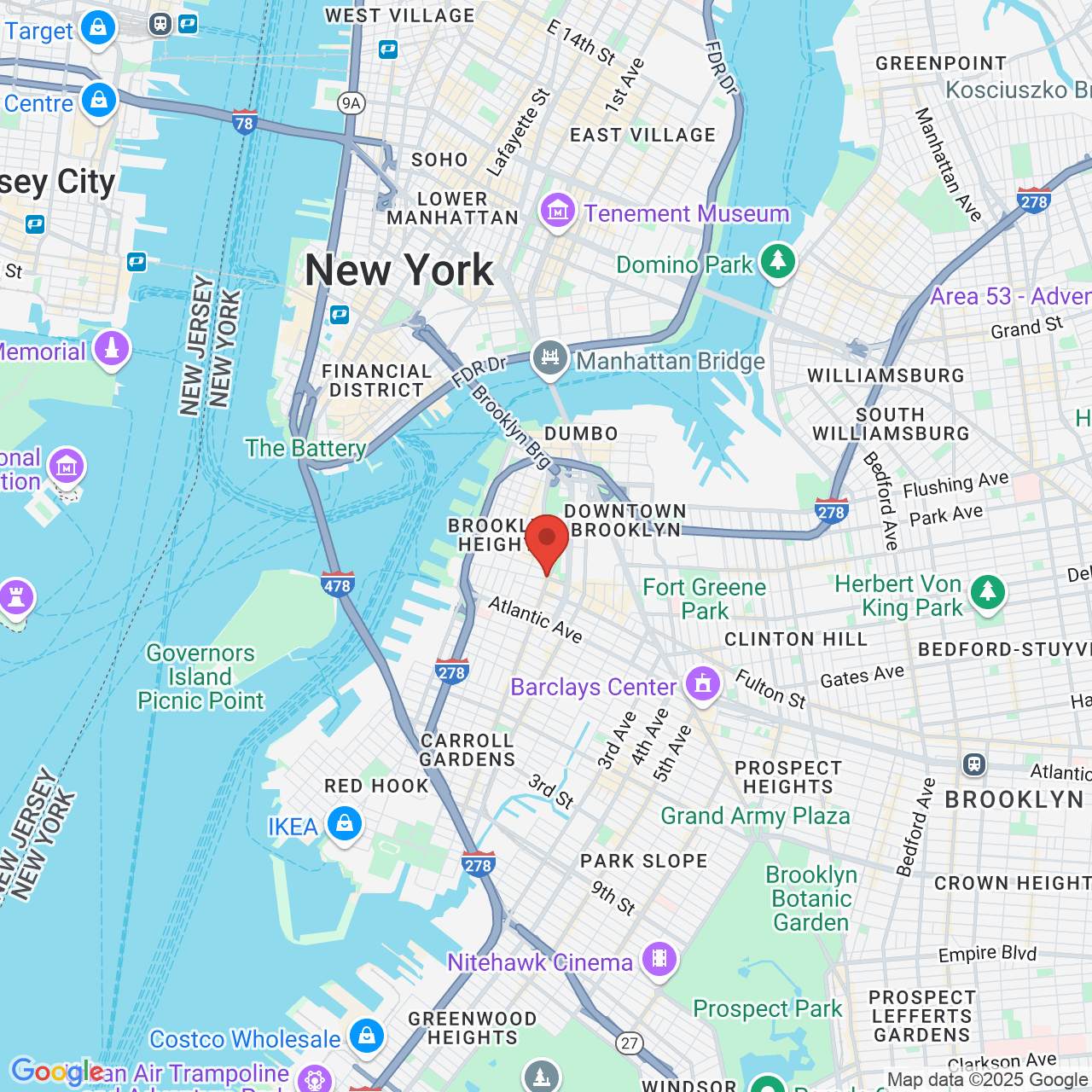
Root Canal
Are You in Pain?
The pain from an infected root canal can be excruciating. If you are suffering, call Brooklyn Heights Dental®. We will see you as soon as possible. We help patients in Brooklyn Heights, Fort Greene, and throughout Brooklyn, NY.
What Is a Root Canal Infection?
When people talk about "root canals" they are usually using shorthand to refer to root canal treatment. This is a dental procedure that removes the infected pulp from the interior of a tooth to prevent bacteria from destroying the tooth and spreading elsewhere in your mouth or other areas of your body.
Contrary to what most people think, a root canal procedure actually provides relief from the pain of an infection.
If you suspect you have a root canal infection, Dr. Eugene D. Stanislaus and Dr. Lisa Reid at Brooklyn Heights Dental® can use x-rays and other tests to confirm an infection and treat your tooth without having to see an endodontist.
Brooklyn Heights Dental® is also equipped with advanced CEREC ® technology that allows our dentists to restore your tooth with a protective dental crown during the same office visit.
How Cavities Can Cause a Root Canal Infection

Take It from a Patient: Root Canals Are Painless
There just aren’t enough stars to rate Brooklyn Heights Dental staff. I had sensitivity and pain and required root canal therapy on 2/23/21. From the moment you’re received by the smiling face and greetings, from Marianne at reception, to the gentle hands of the hygienists, Ms.. G or Tatiana, my anxieties are lowered. I’m then further impressed by 1 of my favorite dental assistant Demetria, prepping me for my eventual root canal, with pleasantries and related info for the procedure, eases my mind. My proverbial icing on the cake is Dr Stanislaus, jovial personality, always professional, armed with his “special sauce” (a.k.a. local anesthesia), made my procedure painless. I am a regular patient of Dr Reid, who is equally as wonderful as Dr. Stanislaus. KUDOS BHD, I AM A PATIENT FOR LIFE! Thank you all for your stellar service.
View More Google ReviewsDon't Delay Root Canal Therapy Call for a Consultation
Prompt treatment of an infected root canal reduces the chances of needing tooth extraction, experiencing bone loss, and suffering the spread of infection, all of which can lead to more costly dental procedures.
Drs. Stanislaus and Reid at Brooklyn Heights Dental® can gently remove the infection and put a dental crown over the tooth to protect it, often in one visit.
Remember: Root canal infections won't get better on their own. If you suspect an infection, our highly trained dentists will use x-rays of your teeth and other tests to determine the source of your discomfort and treat it without having to see an endodontist.
(718) 857-6639
Serving Brooklyn Heights, Fort Greene, and All of Brooklyn, NY
Patients Appreciate Our Compassionate Care
I will highly recommend Brooklyn Heights Dental. Their services are splendid in all matters ... I have PTSD and sometimes, noises, textures, and the anesthesia could make me feel unwell. After spoking with the hygienist, and Dr. Reid they were extra careful, and constantly making sure that I feel heard, safe and comfortable in the chair. THANK YOU!
View More Google ReviewsI had an emergency while on vocation in New York, I call Brooklyn Heights Dental and they we able to fit me with an appointment. The staff was amazing and the doctor was well knowledgeable and experience I’m so great full and thankful for their prompt services.
View More Google ReviewsThe Pain Went Away
Do I Still Need Treatment?
Yes. Even if the pain has gone away, you still need treatment.
The fact that you are no longer in pain means that the nerves inside the tooth are dead. But that doesn't kill the infection. Bacteria can leak out through the tooth roots into the gums and the jaw and even into your bloodstream to cause serious complications throughout the body.
Root canal treatment offered by the dentists at Brooklyn Heights Dental® can save the tooth and restore your oral health.
Root Canal Symptoms
While excruciating pain is a telltale sign of a root canal infection, sometimes you can have an infection without any pain at all. Here are some signs of infection that should alert you to see a dentist before symptoms get worse:
- Serious pain when eating or putting pressure on the tooth
- Pain and sensitivity to hot or cold that lingers
- A small, pimple-like bump on the gums
- Darkening of the tooth
- Tenderness or swelling in the gums
Root Canal Treatment A Closer Look
How Is a Root Canal Treated?

Comfort First
Before root canal therapy begins, our dentists will carefully numb the area so that you can be comfortable throughout the procedure. The use of local anesthesia will make the root canal procedure virtually pain-free and not that much different than having a cavity filled. However, if you desire, we can also provide sedatives to help you relax.

Accessing the Root Canals
An opening is made in the top of the tooth so the dentist can reach the interior. To eliminate the infection, the dentists will remove the dental pulp inside the tooth, which consists of nerves, blood vessels, and soft connective tissue. The inside of the tooth will then be disinfected and filled with gutta percha, a rubber-like material, for support.

Restoring the Tooth
Our dentists will probably need to place a crown on the tooth to strengthen it after root canal therapy. In many cases, we can design and fabricate the crown immediately after your root canal procedure so you won't have to return to have a lab-made crown placed on the tooth.


